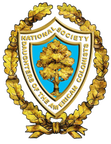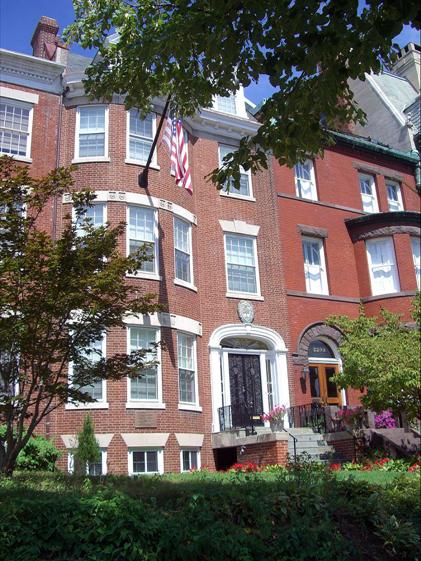Object of the Society
The object of this Society shall be:
The object of this Society shall be:
- Patriotic, Historical, and Educational;
- to make research as to the history and deeds of the American colonist and to record and publish the same;
- to commemorate deeds of colonial interest;
- to inculcate and foster love of America and its institutions by all its residents;
- to obey its laws and venerate its flag—the emblem of its power and civic righteousness.
|
NSDAC Headquarters
Headquarters, NSDAC 2205 Massachusetts Ave, NW Washington, DC 20008-2813 Telephone: (202) 667-3076 Email: admin@nsdac.org The National Society Daughters of The American Colonists has an excellent genealogical library with many hundreds of books and manuscripts at National Headquarters, located at 2205 Massachusetts Avenue, N.W, on Embassy Row in Washington, D.C. This handsome building is furnished with authentic period pieces and has the air of a gracious private home. There are small meeting rooms, an office, and comfortable quarters for the National President and other officers during National Board meetings. This building is ably maintained by the National Headquarters Committee and is opened to members during the General Assembly, held yearly in April and attended by members from across the country. |
NSDAC Info
Founded: December 9, 1920, by Sarah Elizabeth Mitchell Guernsey (Mrs. George T.)
Incorporated: April 25, 1921. Federal Charter was granted the Ninety-eighth United States Congress as Public Law 98-561 on October 30, 1984.
Object of the Society:
The object of this Society shall be Patriotic, Historical, and Educational; to make research as to the history and deeds of the American colonist and to record and publish the same; to commemorate deeds of colonial interest; to inculcate and foster love of America and its institutions by all its residents; to obey its laws and venerate its flag—the emblem of its power and civic righteousness.
Motto: Past, Present, Future
Theme: Working together to promote lifelong learning.
Colors: Colonial Blue & Yellow
Emblem: Oak Leaf
Seal:
The Seal of this Society shall be composed of an open wreath of acorns and oak leaves measuring 1 9/16 inches in width and 2 inches in height. In the center of this wreath shall be a shield measuring in width, 1 inch, and in height, 1 4/16 inches. The border of the shield shall bear the name of the Society, “National Society Daughters of the American Colonists.” In the center of the shield shall be an oak tree in full foliage.
Management:
The National Society is led by the National President and an Executive Committee consisting of all of the National Officers, all Honorary National Presidents, and three Honorary National Vices Presidents selected by the National President. In addition to rulings by the Executive Board, policy for the Society is made by the National Board, a body composed of the National Officers , the Honorary National Officers, and the State Regents. The Chairmen of National Committees are National Board members without a vote.
The National Board meets prior to and after General Assembly, and in October. Ballot votes are cast in January and June for specific purposes authorized in the National Bylaws, Article XI, Section 2. Elections are held every third year.
The constituent bodies of the National Society are chapters, states societies (states having two or more chapters), and state societies without chapter; which are grouped into five geographical sections.
|
For more information about NSDAC: http://nsdac.org/
|
Publications
Lineage Books:One of the foremost objects of the organization is to search out and preserve records of the Founders and early settlers of our country. Lineage Books containing the colonial services of the ancestors and lines of descent of members of the organization are published for each 1,000 applications approved. The first lineage book contained numbers 1 to 1000, the second volume covered 1001 to 2000, and so forth. Currently, the 41th lineage book is in progress.
Magazine:The DAC magazine, “The Colonial Courier”, is the official publication of the Society and is published three times a year. It contains articles relating to the activities of Chapters and State Societies, and of historical and genealogical interest. Copies are purchased by members and given to school, public, and university libraries.
Yearbook:A comprehensive National Yearbook is printed each year which includes the National and State Officers, Chapter Regents, National and Sectional Committee Chairmen, current National Bylaws, Annual reports by National Officers, and National Committee Chairmen, and State Regents. Also included are the guidelines for processing applications, reinstatements, and transers; regulations for submitting annual reports; and instructions for ordering supplies and publications.
Lineage Books:One of the foremost objects of the organization is to search out and preserve records of the Founders and early settlers of our country. Lineage Books containing the colonial services of the ancestors and lines of descent of members of the organization are published for each 1,000 applications approved. The first lineage book contained numbers 1 to 1000, the second volume covered 1001 to 2000, and so forth. Currently, the 41th lineage book is in progress.
Magazine:The DAC magazine, “The Colonial Courier”, is the official publication of the Society and is published three times a year. It contains articles relating to the activities of Chapters and State Societies, and of historical and genealogical interest. Copies are purchased by members and given to school, public, and university libraries.
Yearbook:A comprehensive National Yearbook is printed each year which includes the National and State Officers, Chapter Regents, National and Sectional Committee Chairmen, current National Bylaws, Annual reports by National Officers, and National Committee Chairmen, and State Regents. Also included are the guidelines for processing applications, reinstatements, and transers; regulations for submitting annual reports; and instructions for ordering supplies and publications.

